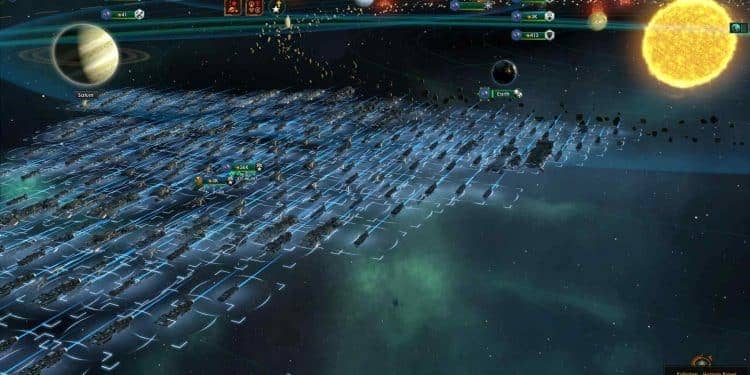Stellaris is an excellent game to play. Its most notable elements include the game’s depth and its perfect claiming system. This game includes research, exploration, and economic management. It also adds the joy of beating your enemies to dust and conquering the galaxy. Remember, defeating and winning enemies enhance your gaming experience.
The Stellaris PC game (developed by Paradox) fits the definition of an excellent strategy space game. Stellaris is a multiplayer real-time planning game. It is set in a space that has a pausing option. Your empire begins as a single planet, exploring the galaxy and aspiring to become the star-spanning empire it was born to be.
With the release of the Federations DLC and the Verne 2.6 patch, Stellaris has upgraded recently. The early game has plenty of mysteries and intriguing challenges. This game has the ability to draw you in immediately. With its perplexing challenges and exciting quests, you will have an excellent gaming experience.
Early Game
One of the earliest things you will do is send your spaceship into space, searching for extra planets and aliens. Also, by discovering anomalies, aliens, ancient sites, and specific occurrences while investigating, you feel like you’re exploring something real. This exploration boosts your XP and gives you a detailed understanding of the game. Your empire will need resources as a fledgling space-faring race; thus, mining stations are essential.
While your spaceships focus on the outside world, your scientists focus on farming food and improvising the technology. These scientists try to explore new inventions to keep your fledgling empire afloat.
Your rulers will concentrate on the infrastructure of your empire that includes constructing planetary structures, research, food sources, and exotic foundries to exploit the riches discovered in space by your spaceships.
The game offers depth, variety, and kind of unexpected results and makes it intriguing and exciting without any extra DLCs. Although this game will not skip layers of study, research does not follow any defined pattern.
What excites the players the most is that they have control over the type of study or research that will be next. Items in the realm of rocketry are more likely to be offered if a scientist who specializes in it is available.
The diversity extends to the races you can choose, whether they are humans, birds, charming small cuddly creatures, or any other strange alien, as well as their government and ethics types.
At the beginning of the game, exploration is probably the most exciting component. Discovering habitable planets is essential for your space race to expand. Furthermore, you can never know when you’ll meet a new ally or enemy; or if the latest star you discovered has reawakened some old empire that has lost research interest but is happy to deal with you if you try to mingle them.
You’ll eventually meet some people with chips on their shoulders. You will have to combat them, and you will have to beat them. It’s a task to prepare your empire for that particular day and to carefully position your caravansaries so that they can get to the battlefront as rapidly as possible.
The game has the best war-score system. You will not be destroyed militarily or economically if you engage and your enemy wins. You may lose some land, but it won’t be enough to put you out of the game. The fights in galactic space are so spectacular!
You will spend hours managing your buildings on your earned planets properly. Moreover, you need a lot of time to excavate archaeological sites if you have the DLC for Ancient Ruins or dealing with a UN in Space if you have the latest Federations DLC, all while having eyes on your neighbors.
Federations appear in the late game until the beginning of the midgame, and if you own the DLC of Federations, they become even more fascinating to handle. If you wish to survive all those paranoid neighbors who want to conquer everything and gang up against your squad or you, you’ll need those pals.
Definitely, if they prevail and you live, they could even let you serve them. We advise you to have the numbers, and that’s actually what this stage requires.
The end-game is also intriguing and fun to play, unlike practically every other strategy game. You can still lose everything in some end-game missions and crises, such as an attack by the Unbidden.
That adds excitement to the ending of the game. You may be the most powerful bull in your cluster, but there’s always a new neighborhood bull around the corner or from another cluster or galaxy.
Also read: The Best Beginners Settings for Stellaris
War Scores

The war-score system protects you from losing everything if you lose. It also makes it difficult to beat your enemy in a single tremendous blow. Your objectives will decide how high of a war score you need to defeat your enemy.
Many factors influence your war score, and the game’s recommendations will describe you exactly what they are after the war is launched. Your battle goals will eventually define your war score.
Many factors influence your war score, and after the war is started, the in-game tooltips will tell you exactly what they are. Your war achievements determine your Warscore in the end.
Essentially, the greater the war goal number, the more difficult it is to beat the enemy and win the war decisively. Each claim of a system adds ten points to the war achievement, and each claim of a planet adds one hundred points.
If you have a great battle aim to complete, having superior Navy offsets might help. However, it’s only a small benefit at most.
With a large war objective number, you may lose the war before even starting it. This tactic forces you to accept peace conditions that you don’t want. The top combatants can end the war with an SQ Peace (Status Quo), which has a lower war goal.
Any systems you’ve occupied and occupied will be retained in this form of peace, whereas any system claimed and claimed by your enemy will be lost. Suppose you’ve already gotten everything you wish and haven’t lost anything. In that case, this is the best alternative because you won’t acquire any more land if your enemy accepts his defeat and surrenders.
Stellaris’ combat is beautiful, but it is largely automated. You can customize ship stances and fleets based on the adversary you’re up against, but you won’t be able to manage your ships directly. However, not controlling individual ships is a beneficial feature in Stellaris because fights might involve many ships, making micromanaging each ship impractical.
The graphics in the combat are fantastic. You can use micro zoom to see ships shooting each other while maneuvering for a better firing position. It’s also rather lovely to watch those lasers lashing out at the enemies.
Even if your fleet is numerically powerful, if your attacker has offensive weaponry that exploits your fleet’s weak points, they can rip you apart. If possible, investigate the specifics of the enemy ship before a conflict.
However, a casus belli is required before war can be declared.
Claiming part of your neighbor’s systems is the quickest way to establish a casus belli. Obtaining them will be costing Influence, which is frequently in low supply due to its various uses, such as discovering new areas.
The Claim system appears to be very easy. Instead of a complicated set of problems to clear before claiming and initiating the war, you only click on the Claims button and select which systems you wish to be yours. You will need influence for it. You might not have much to start claiming every network you wish, but you’ll have that crucial casus belli. It allows you to launch a war and empower your territory.
Also read: Stellaris Megastructures Guide
Resources

As you travel, you’ll come across a variety of resources. These resources vary from place to place. Some of these resources are common, such as minerals and energy, and others that are uncommon but not usable until you’ve done the proper research, such as exotic gases utilized in advanced armament on your spaceships.
Unless a starbase is equipped focus honed with a hydroponic bay, food is the only thing you can farm in space. Food is primarily generated on planets, as with everything else in Stellaris. In comparison, some other planets are better for food production.
The Agricultural District is the planet’s primary source of food production. It provides plenty of food.
Conclusion
I could easily create a second article on this game solely to answer that topic. There’s a lot more to say about this game, such as the fleet manager, ethics, government type, traditions, the influence system and how it works, and the ship designer (and that’s still not everything), but the bottom line is that it’s a hugely complex and diversified game. If you enjoy space games, this is the game for you.
That’s it gamers! If you have any other queries related to Stellaris, let us know in the comment section. We will try to reply as soon as possible.



